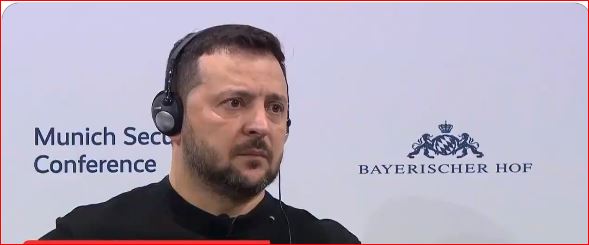Ukraine’s President Volodymyr Zelenskyy has warned that if his country lost the war to Russia, it would have catastrophic consequences for the rest of the world. Addressing the Munich Security Conference on Saturday, he said the death of dissident Russian politician Aleksei A. Navalny in an Arctic penal colony a day earlier was proof that Russian President Vladimir Putin would continue to test the resolve of the rules-based Western order.
“This is Russia’s war against any rules at all. But how long will the world let Russia be like this? This is the main question today,” he said.
“Remember, everyone, that dictators do not go on vacation,” he warned, in a obvious dig at the US, where Congress adjourned for a 12-day winter vacation on Friday without passing a $95 billion aid package that includes $ 60 billion for Ukraine. The Senate had approved the aid package in a bipartisan vote on Tuesday, but House Speaker Mike Johnson, a Republican, warned that the lower chamber would not vote on it without additional funding for border security.
US President Joe Biden, a staunch supporter of Ukraine, described the decision to call a two-week recess without clearing the aid for Ukraine as “outrageous” and bizarre.
“Because Congress has yet to pass the supplemental bill, we have not been able to provide Ukraine with the artillery shells that they desperately need to disrupt these Russian assaults,” White House National Security Spokesperson John Kirby said on Thursday, a day before the House vacation started.
Zelenskyy’s speech at Munich comes on a day that his troops retreated from Avdiivka — a small industrial city in the eastern Donbas region which had become a symbol of Ukrainian resistance—due to shortage of ammunition.
“The situation today is bad. And that’s not my political assessment, it’s the message we receive from the front line,” said Ukraine’s foreign minister Dmytro Kuleba, who is also at the Munich conference. The problem was not just in terms of supply, but also of different kinds of systems and ammunition coming in from the West, which posed a logistical nightmare for the Ukranian forces, he said. “Common production of weapons, technical alignment, and big quantities — this is the answer…And we have to get there very quickly,” he said.
Asserting that under the circumstances, pulling out of Avdiivka was the right decision to avoid being surrounded and save as many lives as possible, Zelenskyy said that it was a “myth” that Ukraine could not win. “We can get our land back and Putin can lose. Please do not ask Ukraine when the war will end. Ask yourself why is Putin still able to continue it.”
Later in the day, Zelenskyy met US Vice President Kamala Harris, who told reporters that “it is in the strategic interest of the United States to continue our support” to Ukraine.
Asserting that support from her and President Biden was “unyielding and unending,” she said. Referring to the US gridlock, she said “Political gamesmanship has no role to play in what is fundamentally about the significance of standing with an ally as it endures unprovoked aggression.”
Zelensky also spoke to President Biden on the phone.
“While in Munich, I had a call with @POTUS Joe Biden. We discussed the current frontline situation. I am grateful to have President Biden’s full support. I also believe that the US Congress will make a wise decision. Supporting Ukraine means supporting democracy and freedom. Together, we must protect these values. We agreed to stay in touch as Russia’s full-scale aggression against Ukraine approaches the two-year mark,” he posted on X, formerly Twitter.
While in Munich, I had a call with @POTUS Joe Biden.
We discussed the current frontline situation. I am grateful to have President Biden’s full support. I also believe that the US Congress will make a wise decision.
Supporting Ukraine means supporting democracy and freedom.…
— Volodymyr Zelenskyy / Володимир Зеленський (@ZelenskyyUa) February 17, 2024
Also See:
In a career spanning three decades and counting, Ramananda (Ram to his friends) has been the foreign editor of The Telegraph, Outlook Magazine and the New Indian Express. He helped set up rediff.com’s editorial operations in San Jose and New York, helmed sify.com, and was the founder editor of India.com.
His work has featured in national and international publications like the Al Jazeera Centre for Studies, Global Times and Ashahi Shimbun. But his one constant over all these years, he says, has been the attempt to understand rising India’s place in the world.
He can rustle up a mean salad, his oil-less pepper chicken is to die for, and all it takes is some beer and rhythm and blues to rock his soul.
Talk to him about foreign and strategic affairs, media, South Asia, China, and of course India.





